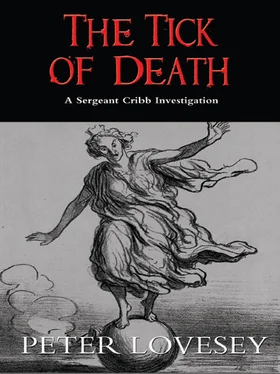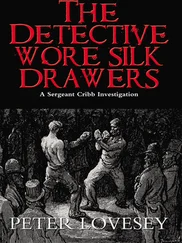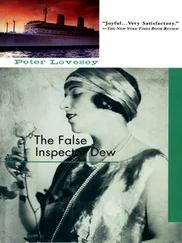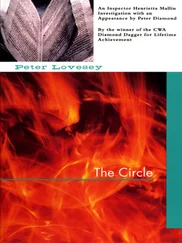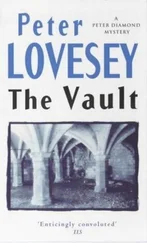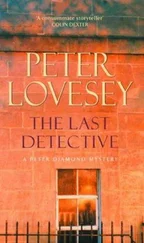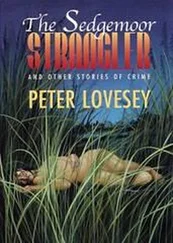Peter Lovesey - The Tick of Death
Здесь есть возможность читать онлайн «Peter Lovesey - The Tick of Death» весь текст электронной книги совершенно бесплатно (целиком полную версию без сокращений). В некоторых случаях можно слушать аудио, скачать через торрент в формате fb2 и присутствует краткое содержание. Жанр: Исторический детектив, на английском языке. Описание произведения, (предисловие) а так же отзывы посетителей доступны на портале библиотеки ЛибКат.
- Название:The Tick of Death
- Автор:
- Жанр:
- Год:неизвестен
- ISBN:нет данных
- Рейтинг книги:3 / 5. Голосов: 1
-
Избранное:Добавить в избранное
- Отзывы:
-
Ваша оценка:
- 60
- 1
- 2
- 3
- 4
- 5
The Tick of Death: краткое содержание, описание и аннотация
Предлагаем к чтению аннотацию, описание, краткое содержание или предисловие (зависит от того, что написал сам автор книги «The Tick of Death»). Если вы не нашли необходимую информацию о книге — напишите в комментариях, мы постараемся отыскать её.
The Tick of Death — читать онлайн бесплатно полную книгу (весь текст) целиком
Ниже представлен текст книги, разбитый по страницам. Система сохранения места последней прочитанной страницы, позволяет с удобством читать онлайн бесплатно книгу «The Tick of Death», без необходимости каждый раз заново искать на чём Вы остановились. Поставьте закладку, и сможете в любой момент перейти на страницу, на которой закончили чтение.
Интервал:
Закладка:
‘Anarchists and revolutionists the world over can regard Mr Nobel as their greatest benefactor, then,’ said Jowett. ‘A fine reputation to have!’
‘Ah, but so can miners and road-builders and railway-engineers. The revolution in the civil engineering industry is far more impressive than anything your anarchists have achieved with dynamite, Inspector. Now, Sergeant, let us resume our examination of the object found on Paddington station. .’
‘A first-class bore, that Colonel Martin,’ Jowett declared. ‘It’s always so with these forensic experts. Inspectors of explosives, pathologists, toxicologists-they’re all alike. They get too close to their work, lose all perspective. I know-I’m dealing with them all the time. Utterly boring. It’s an experience you’ve been spared until today, Sergeant, getting your information from me, as you usually do.’
Cribb quietly noted the irony in the statement, and looked across the marshland towards the Thames. They were returning from the Danger Buildings to the main gate in the first class compartment of the Arsenal train, a narrow-gauge, single-line service used for transporting personnel about the three mile extent of the grounds. The Colonel had remained behind, pleading extra investigation-work. Cribb suspected he preferred half an hour with the infernal machines to fifteen minutes more with Jowett.
It was a desolate stretch of land, broader in extent than Kensington Gardens and Hyde Park together, but without trees. The skyline was broken instead by mist-patches of varying intensity, and tall banks of earth-probably rifle-butts, but conceivably the tops of subterranean buildings. This suggestion of the other-worldly was reinforced by the occasional sighting of workers dressed identically in canvas jackets and trousers and hats with numbers attached. A group boarded the train at a stop called Mugby Junction- all third-class passengers, who had to sit back-to-back on open wagons at the rear.
‘There are ten thousand or more employed here,’ said Jowett, ‘and they change into those clothes on arrival. There is a strict rule forbidding tobacco or matches, and anyone found disobeying it is dismissed. They have their last smoke on the way to work in the mornings and then throw away their clay pipes-which they have got free from public houses-by the entrance. I was reliably informed by the police on duty that the debris lies ankle-deep at the gate until the road-sweeper arrives each morning.’
Cribb acknowledged this information with a nod, prompted as much by the train’s motion as interest in Jowett’s monologue. He felt no obligation to exchange small-talk at this stage. It was high time Jowett told him the real purpose of the visit to the Arsenal. He had a right to be told, but he was damned if he would ask.
‘Then there is a thriving community who live inside the Arsenal. They are mainly officers and members of the managerial staff and their families, with the servants housed in converted stables nearby. It is a veritable walled town, concentrated near the main gate, with its own shops and hospital. And the section-house, of course, for members of the Force. That’s where you will be lodging.’
Cribb turned from the carriage-window. ‘Me? What do you mean, sir?’
‘Exactly as I say, Sergeant. A room has been prepared for you. I’m told it’s very comfortable once you get used to the bell they ring at intervals. I have arranged for you to move in tonight. Now don’t look so outraged-you might say something you’ll regret. There is time for you to collect your things from your quarters and inform your dependants. The gate is locked at midnight, ten minutes after the closing-bell sounds.’
There was silence while Cribb struggled to subdue his fury and Jowett almost slavered over the exercise of his authority.
‘Why should I need to lodge here?’
‘The need was made abundantly clear this afternoon, Sergeant. I believe the import of what you said to Colonel Martin was that you are completely ignorant upon the subject of infernal machines. We are giving you the opportunity of becoming better informed. You will remain here until such time as the Colonel deems you sufficiently enlightened.’
It sounded like a prison sentence. ‘Sufficiently for what, sir?’
‘Ah. We shall come to that. You will admit, I hope, that the finer points of bomb-manufacture cannot be learned in a single afternoon. In a few weeks or so, Cribb, if you are an attentive pupil, you should graduate from this academy as the best-informed detective in the Force-upon explosives, that is.’
‘Why me, sir?’
‘I think we are approaching the main gate, Sergeant. Ah, now that is Dial Square, and the section house is on the side street nearest the gate. Do you see it? That is where you report tonight. We shall shortly transfer to a cab, and I shall endeavour to answer your question on the journey back to Scotland Yard.’
‘Do you recall the start of the dynamite campaign?’ Jowett resumed, when their hansom was making good speed along the Woolwich Road.
Cribb drew a deep breath. Getting information from Jowett was never straightforward. ‘In London, sir? I think the attempt on the Mansion House was the first, in the spring of 1882. Someone found a canister of dynamite attached to the railings.’
‘Ah, yes. But the first explosion?’
‘That was last year, sir, in March. The Local Government Board Offices in Charles Street.’
‘Yes. Four or five rooms were totally demolished. And by a singular misfortune the building was situated opposite the headquarters of “A” division, the King Street police station. It broke every window in the place, Cribb. The attack on The Times office the same night was only averted, if you recall, by the resourcefulness of a night-watchman with a bucket of water. That night’s doings more than anything else precipitated the passing of the new Explosives Act. Then, three weeks later, public confidence was restored by a timely police success, the discovery of the nitro-glycerine manufactory at Birmingham and the arrest of the infamous Dr Gallagher and his fellow-conspirators. It confirmed what many had suspected-that the dynamitards were Irish-Americans, and the campaign a ruthless attempt to bring the issue of Home Rule before the public-possibly even to intimidate the Government into yielding to the Irish faction. You haven’t any Irish blood in your family, have you, Sergeant?’
‘No, sir.’
‘Excellent. Not that one questions your loyalty, of course. We cannot over-estimate the dangers involved in this business. If a certain detective in Birmingham had not had his suspicions aroused by the behaviour of the man Whitehead, the chemist of the plotters, and visited him in disguise, we might well have seen the swift destruction of many of London’s finest edifices. There was enough nitro-glycerine there to demolish every street in the City of London, Cribb. He was consigning it to the Metropolis in india-rubber fishing-boots contained in packing-cases. The others, who frequented small hotels and retired lodgings in the south of London, were arrested before they could carry out their frightful work. Gallagher himself, the brains of the conspiracy, had travelled over first-class in the Cunarder Parthia and was living as a gentleman in the Strand, if you can credit that. He and three others were given penal servitude for life. And there the matter ended, until the two explosions on the Underground Railway last October. Railway property was seriously damaged. The cost of repairs amounted to several thousand pounds, did you know that? I believe a number of passengers were maimed for life by the Praed Street explosion as well-only men of the labouring-class, but no less worthy of our pity for that, Sergeant. Incidents of that sort impress the populace. The newspapers made a good deal of it. Fears were revived, Sergeant, fears were revived.’
Читать дальшеИнтервал:
Закладка:
Похожие книги на «The Tick of Death»
Представляем Вашему вниманию похожие книги на «The Tick of Death» списком для выбора. Мы отобрали схожую по названию и смыслу литературу в надежде предоставить читателям больше вариантов отыскать новые, интересные, ещё непрочитанные произведения.
Обсуждение, отзывы о книге «The Tick of Death» и просто собственные мнения читателей. Оставьте ваши комментарии, напишите, что Вы думаете о произведении, его смысле или главных героях. Укажите что конкретно понравилось, а что нет, и почему Вы так считаете.
